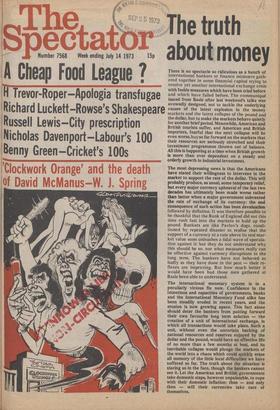SEP 2 5 1973 The truth
about money
There is no spectacle so ridiculous as a bunch of international bankers or finance ministers gathered together in some financial capital trying to resolve yet another international exchange crisis with feeble measures which have been tried before and which have failed before. The communiqué issued from Basle after last weekend's talks was avowedly designed, not to tackle the underlying causes of the latest explosion in the money markets and the latest collapse of the pound and the dollar, but to make the markets behave quietly for another brief period. Meanwhile, American and British tourists suffer, and American and British importers, fearful that the next collapse will be even worse,buyso far forward on the markets that their resources are seriously stretched and their Investment programmes thrown out of balance. All this is happening at a time when British growth is more than ever dependent on a steady and orderly growth in industrial investment.
The most depressing news is that the Americans have stated their willingness to intervene in the market to support the rate of the dollar. This will probably produce, as usual, some temporary relief, but every major currency upheaval of the last two decades has ultimately been made worse rather than better when a major government subvented the rate of exchange of its currency: the end consequence of such action has been devaluation followed by deflation. It was therefore possible to be thankful that the Bank of England did not this time rush fast into the markets to hold up the pound. Bankers are like Pavlov's dogs, conditioned by repeated disaster to realise that the support of a currency at a rate above its real market value soon unleashes a tidal wave of speculation against it: but they do not understand why this should be so, nor what measures really can be effective against currency disruptions in the long term. The bankers have not behaved as badly as they have done in the past — their reflexes are improving. But how much better it would have been had those men gathered at Basle been able to understand.
The international monetary system is in a peculiarly vicious fix now. Confidence in the intentions and capacities of governments, banks and the International Monetary Fund alike has been steadily eroded in recent years, and the erosion is now growing apace. This fact alone should deter the bankers from putting forward their own favourite long term solution — the creation of a unit of international exchange, in which all transactions would take place. Such a unit, without even the uncertain backing of national resources and reserves enjoyed by the dollar and the pound, would have an effective life of no more than a few months at best, and its inevitable collapse would plunge the markets of the world into a chaos which could quickly erase all memory of the little local difficulties we have suffered so far. The truth about the situation is staring us in the face, though the bankers cannot see it. Let the American and British governments take domestic steps, however unpalatable, to cope with their domestic inflation: then — and only then — will their currencies take care of themselves.






























